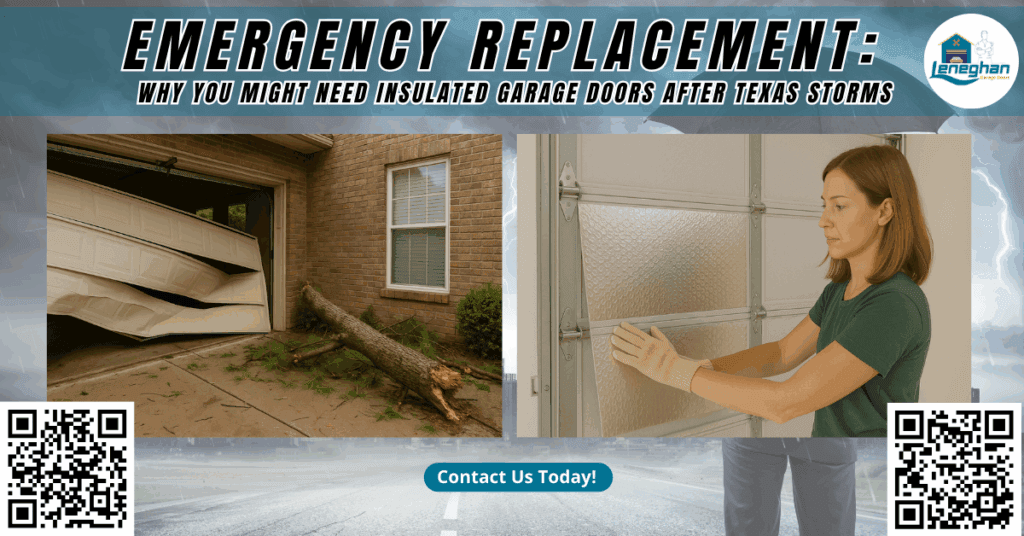After a brutal storm hit Houston last summer, one of our customers in the Starling neighborhood faced a nightmare. Their non-insulated garage doors was torn off its hinges during strong winds, allowing water to flood into their garage space. The damage extended beyond the garage, soaked insulation in the adjacent walls, a fried garage door opener, and rusting tools that had been stored for years. That customer thought their standard single-layer door was enough until it wasn’t.
Each year, the Texas Gulf Coast faces multiple storms that bring high-speed winds, intense rainfall, and in some cases, hail. With over 50 thunderstorm days annually, homeowners often find themselves dealing with the aftermath of repairs. The garage, usually the largest opening in the home, is especially vulnerable. But this doesn’t have to be the case. At Leneghan Garage Doors, we’ve seen firsthand how insulated garage doors protect homes and businesses from storm damage and save owners money in the long run.
Whether you’re storing your car, tools, or using your garage as a workshop or gym, having the right garage door insulation can make a huge difference. Let’s take a deeper dive into why insulated garage doors are a smart emergency replacement choice after a storm and how they offer far more than just protection from the elements.
What Are Insulated Garage Doors?
Insulated garage doors are multi-layered garage door systems designed to maintain a stable temperature inside the garage while protecting the interior from thermal transfer and weather damage. Unlike non-insulated doors, which typically consist of a single thin layer of steel or aluminum, insulated garage doors feature multiple layers of insulation material, such as polyurethane, polystyrene, or rigid foam.
Door Construction and Insulation Materials
These doors may be used:
- Polyurethane Foam – Known for its high R-value and tight thermal sealing, this is a urethane-based foam that expands to fill the space inside the panels.
- Polystyrene Panels – A more affordable option, usually cut and inserted inside the door panels.
- Batt Insulation – Found in some DIY garage door insulation kits, this fiberglass material is less commonly used in high-end doors.
The R-value measures thermal resistance; the higher the R-value, the better the insulation. For example, a well-insulated door can have R-values from R-10 to R-18+, depending on the insulation type and door construction material.
Types of Insulated Garage Doors
- Sectional Doors – Most common, highly customizable, and easily insulated.
- Carriage-Style Doors – Classic look, often used in high-end homes.
- Craftsman Garage Doors – Known for decorative hardware and natural finishes.
- Steel or Aluminum Garage Doors – Often pre-insulated with foam.
- Fiberglass Doors – Lightweight and resistant to denting.
Top brands like Amarr Garage Doors, Clopay Garage Doors, and Martin Garage Doors offer a wide range of insulated garage door options, tailored for both residential and commercial properties.
Why Texas Storms Are So Dangerous for Garage Doors
Texas weather can be unpredictable. From tropical storms and hurricanes to summer thunderstorms and even winter cold snaps, the garage door becomes a frontline defense for your home.
Common Storm-Related Garage Door Damage
- Wind damage can warp or detach non-insulated doors, especially older single-door models.
- Water intrusion can corrode parts, weaken the logic board in openers, and promote mold growth.
- Power surges from lightning can destroy garage door opener systems, especially when combined with exposed electronics like a light socket.
- Flying debris can dent or puncture thin steel or aluminum doors.
A damaged door not only affects the garage it can also compromise your entire home’s energy efficiency by allowing heat transfer and air leakage, leading to higher energy bills.
The Benefits of Insulated Garage Doors After a Storm
1. Durability and Strength
Insulated doors have thick insulation sandwiched between heavy-duty steel or aluminum layers. This makes them more resistant to impacts from debris and less likely to warp or buckle during strong winds. These insulated doors are built for long-term durability.
2. Weather and Water Resistance
High-quality insulated garage doors are equipped with weatherstripping, tight seals, and solid panels that prevent water from entering your garage space. This is particularly useful in flood-prone areas like Houston.
3. Improved Energy Efficiency
An insulated door acts as a barrier to temperature fluctuations, reducing heat transfer during the summer and retaining warmth during the winter. This stabilizes indoor garage temperature, protects interior walls, and supports your HVAC system. Better energy efficiency equals energy savings and a return on investment over time.
4. Noise Reduction
With a thick layer of insulation, these doors offer excellent noise reduction, shielding your garage from the clatter of storms or loud neighbors. Whether you’re using your garage as a workshop, gym, or living space, this quiet upgrade is invaluable.
5. Protection for Stored Items and Cars
Stored belongings, tools, and even your car are better protected against moisture, mold, and rust. The garage door insulation also shields electronics and tools from extreme temperatures.
When Should You Replace Your Garage Door After a Storm?
It’s not always obvious when a garage door has taken too much damage, especially if you only look at surface scratches. Watch out for:
- Misalignment or sagging
- Unusual noise during opening/closing
- Bent or dented panels
- Water is pooling inside the garage
- A sudden spike in energy bills
- Failure of the garage door opener or logic board
If you’re relying on an older single-layer door, or if your insulation is degraded or missing, it’s time to consider a new garage door, preferably an insulated garage door.
How Much Does an Insulated Garage Door Cost?
Costs vary based on:
- Material: Steel doors with polyurethane insulation tend to be pricier than aluminum with polystyrene.
- Door Size: Single doors cost less than double or custom garage doors.
- Insulation Type: Polyurethane has a higher initial cost but better R-values.
- Design Features: Windows, colors, textures, and smart tech (like Chamberlain garage door openers) add to the cost.
Although the initial investment can seem high, you’ll gain back that value through energy savings, lower maintenance costs, and a longer-lasting garage door.
DIY vs. Professional Installation
Some homeowners try to add insulation themselves using door insulation kits. While a step-by-step guide might help with adding Styrofoam panels or batt insulation, this approach doesn’t match the efficiency or performance of a factory-insulated garage door system.
Cons of DIY kits include:
- Lower R-values
- Poor fitting
- Limited weather resistance
- Doesn’t fix existing structural or mechanical issues
For lasting results, always consult with experienced professionals who understand the full scope of garage door insulation and installation.
How Can Leneghan Garage Doors Help You?
At Leneghan Garage Doors, we provide expert emergency garage door replacement services across Houston, TX, and nearby Starling areas. Our team is trained to assess storm damage quickly and recommend the best insulated garage door options for your home or business.
We offer:
- Custom-fitted insulated doors
- High-R-value materials, including polyurethane and polystyrene
- Repairs for openers, springs, panels, and logic boards
- Top brands include Amarr, Clopay, and Martin Garage Doors
- Efficient garage door insulation kits and weather sealing
- Full garage system upgrades, including Chamberlain garage door openers
🏠 Visit us: 3025 Kirby Dr, Houston, TX 77098
📞 Call us today: (281) 867-6656
Don’t wait until the next storm hits; invest in your safety, comfort, and energy efficiency with a new insulated garage door. Call Leneghan Garage Doors and get peace of mind with professional-grade protection built to withstand Texas weather.
Frequently Asked Questions (FAQs)
1. What is the difference between polyurethane and polystyrene insulation in garage doors?
Polyurethane insulation is denser and offers a higher R-value per inch, making it more energy-efficient than polystyrene, which is lighter and more affordable but less effective.
2. Can insulated garage doors help with pest control?
Yes, the tighter seals and layered construction of insulated garage doors make it harder for insects, rodents, and other pests to enter your garage.
3. How long does an insulated garage door typically last?
With proper maintenance, insulated garage doors can last 15 to 30 years, often outlasting non-insulated doors due to their durability and resistance to warping.
4. Do insulated garage doors come with smart features?
Many modern insulated garage doors are compatible with smart openers like Chamberlain and Craftsman, allowing for remote access, scheduling, and real-time alerts.


